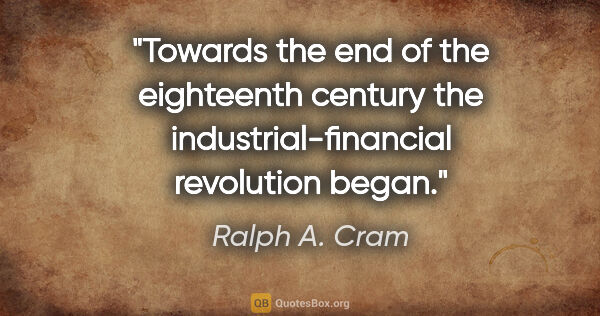Eighteenth Century Quotes
In the eighteenth century, philosophers considered the whole of human knowledge, including science, to be their field and discussed questions such as: Did the universe have a beginning? However, in the nineteenth and twentieth centuries, science became too technical and mathematical for the philosophers, or anyone else except a few specialists. Philosophers reduced the scope of their inquiries so much that Wittgenstein, the most famous philosopher of this century, said, "The sole remaining...
Stephen Hawking

(W)hy is poetry wholly an elderly taste? When I was twenty I could not for the life of me read Shakespeare for pleasure; now it lights me as I walk to think I have two acts of King John tonight, and shall next read Richard the Second. It is poetry that I want now -- long poems. I want the concentration and the romance, and the words all glued together, fused, glowing; having no time to waste any more on prose. When I was twenty I liked Eighteenth Century prose; now it's poetry I want, so I...
Virginia Woolf

After the dazzling orgies in form and color of the eighteenth century, art was put on a diet, and allowed nothing but the straight line. This sort of progress ended in ugliness. Art reduced to a skeleton, was the result. This was the advantage of this kind of wisdom and abstinence; the style was so sober that it became lean.
Victor Hugo
Cambridge exceeded our most macabre expectations ... the arm-chairs, the crumpets, the beautifully-bound eighteenth century volumes, the fires roaring in stoked grates. Each of us had the loan of an absent undergraduate's rooms - bedroom, sitting-room and pantry; all fitted up in a style which, after the spartan simplicity of a public school study, seemed positively sinful.
Christopher Isherwood
One of the regrets of my life is that I did not study Latin. I'm absolutely convinced, the more I understand these eighteenth century people, that it was that grounding in Greek and Latin that gave them their sense of the classic virtues: the classic ideals of honor, virtue, the good society, and their historic examples of what they could try to live up to.
David McCullough
…modern man no longer communicates with the madman […] There is no common language: or rather, it no longer exists; the constitution of madness as mental illness, at the end of the eighteenth century, bears witness to a rupture in a dialogue, gives the separation as already enacted, and expels from the memory all those imperfect words, of no fixed syntax, spoken falteringly, in which the exchange between madness and reason was carried out. The language of psychiatry, which is a monologue by...
Michel Foucault
